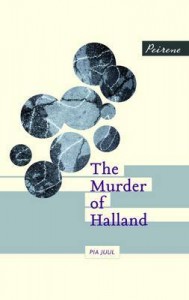The book begins with a murder. Soon detectives are on the scene, and the victim’s life is being unravelled piece by piece, revealing a double life and several people with possible motives.
But this is not your average detective novel. In this respect it reminds me of Tail of the Blue Bird by Nii Akwei Parkes, reviewed on this site last year. Both books incorporate some aspects of genre fiction, while deliberately departing from others and frustrating the reader’s expectations. It made me think about what makes a book “literary” rather than “genre”, a controversial topic brilliantly handled recently by litlove.
This one is by Pia Juul, described on the cover as “Denmark’s foremost literary author”. As this is, I believe, the first Danish book I’ve ever read, I can’t say whether that’s a fair characterisation, or whether there are other pretenders to the crown. Would love to hear from anyone who knows more than me – I’m always a little suspicious of words like “foremost”.
Anyway, back to the what makes this book “literary”. For one thing, The Murder of Halland is narrated in the first person by Halland’s widow, Bess. This makes a difference, because what we see is a very skewed view of the investigation. She discovers some things about Halland, like an apartment in Copenhagen he’d been renting, and a niece who’s pregnant with a child she suspects may be his. She withholds this, and other things, from the police, and is quite detached from the investigation in general. So we don’t get the usual examination of suspects and accumulation of evidence. We don’t get much of the police procedure at all, and we don’t get much sense of progress.
There’s a dreaminess to the narrative throughout. Bess is asleep when her husband is murdered and never seems to fully wake up. The first time a policeman arrives, he seems like a character from a dream, someone she’s seen before, parking his car opposite the house. He arrives, breathless, and shouting that he’s arresting her “in the name of the law”, before disappearing, never to be seen again. When the real police come later, they know nothing about him. The brief episode is slightly surreal and absurd.
Bess also doesn’t behave as a widow is supposed to behave. She worries about the fact that people don’t see her crying, and indeed some other characters comment that she doesn’t seem to be grieving properly. She goes out to a dance and gets drunk on aquavit. She kisses her neighbour on the lips. She examines the history of her relationship with her dead husband in a detached way, completely free of sentimentality. She throws Halland’s niece out of the house for grieving more than she is, and then fantasises about her being hit by a car.
The plot also frustrates the normal conventions, which are actually described within the book, as Bess sits down to make herself happy by watching a detective series:
First a murder, nothing too bestial. Then a police inspector. Insights into his or her personal problems, perhaps. Details about the victim. Puzzles and anomalies. Lines of investigation. Clues. Detours. Breakthrough. Case solved. Nothing like real life.
She tries to make a list of the facts and lines of inquiry in her own husband’s case, but it means nothing to her, and she replaces it with a list beginning “Laundry. Groceries. Dry cleaning.”
This is a book in which the puzzles are not solved, the anomalies are not explained, and the lines of investigation are not pursued (at least within what we see from Bess’s viewpoint). There’s no breakthrough, and the ending is ambiguous, with the police selecting one probable suspect but the last few lines suggesting another possibility altogether.
Nobody behaves quite how you’d expect: the estranged daughter is surprisingly conciliatory, while the bitter ex-husband wants to sleep with her. The neighbour doesn’t react with surprise at being kissed, or really react in any way at all. The more hostile Bess is towards Halland’s niece, the more friendly she is in return. It’s all weird, and yet it all rings true, because in real life people are weird and they do behave in unexpected ways.
Which brings me back to what makes this book “literary”. In the post I referred to earlier by (here, in case you missed it), litlove proposes that “genre tends to reinforce current ideology whilst literary fiction tends to challenge it.” She elaborates by talking about “the ‘cultural gaze’, the sense that certain sorts of behaviours are looked at approvingly and valued, whereas others are not.”
This book is a perfect example. Bess does not behave in ways that are looked at approvingly. She doesn’t do the things that grieving widows are supposed to do. Similarly, the other characters defy convention. They behave in ways that surprise us, challenging our expectations rather than reinforcing them.
The effect on the plot is to make it unsatisfying by normal standards. There’s no rising tension, no breakthrough, no neat resolution. Strands appear to be going somewhere, and then break off. The neighbour is abducted, but then turns up again. Bess finds that Halland transferred a huge amount of money to her account shortly before his death, but this is never explained. The daughter turns up after years of separation, but there’s no big confrontation or reconciliation, and then she goes away again. Everything seems like an anticlimax.
And yet, it works. I think it works because it feels true. I’m reminded of something E.M. Forster wrote in Aspects of the Novel, about the tussle between character and plot – does the author want to give a satisfying plot and corral the characters into doing what he/she wants, or be true to who the characters really are and what they would really do, which may be less satisfying plot-wise? In genre fiction I think the plot often wins out, but in literary fiction it’s about character.
In The Murder of Halland, it’s definitely about character, and the result is something odd, sometimes frustrating, but ultimately successful.





There are 10 comments
I think crime is a very diverse genre and a lot of what is called crime is literary fiction. Some would argue Dostoevsky wrote crime as well. I like the genre a lot but not when it’s focussing too much on solving the crime, the so-called whodunnit, but when the social and psychological analysis is interesting. I don’t think the difference between genre and literary is always that easy, for me it will always be the writing, the style that makes the difference.
I’m not sure I have read a lot of Danish authors, so I cannot judge at all whether she deserves to be called the “foremost author”
Hi Caroline
You’re right, there are a lot of crimes in literary fiction – it’s a fertile topic for a novel, full of opportunities to put characters under stress and see how they react. When I spoke about the crime genre I was really talking about the whodunnit. I have always thought about the distinction between literary and genre fiction primarily in terms of writing style too, but I thought litlove’s way of looking at it was very interesting and got me thinking in new ways.
On the question of “foremost”, I’ve been promised a guest post on Scandinavian literature by someone living and studying in Denmark, so we may all learn more about it soon!
This sounds extremely interesting – and Peirene seem like a fabulous small publisher, bringing out really unconventional books. I love it when literary writers mess with crime. One of my favourite novels is by Patrick Modiano, Rue des Boutiques obscures, which begins as a standard amnesia story only to end with the protagonist still searching for his identity. Anyway, I’ll have to look out for this one, and thank you for the very kind mention!
Ah, I’ve only been back five minutes and already you’re adding new books to my to-read list!! That sounds very good – I’ll have to look it up.
I agree that this becomes literary by toying with our ideas of what a crime novel should be like. It’s an excellent book, one where the whole easily exceeds the sum of the parts. Taken sentence by sentence, it can be almost mundane, yet it simply works 🙂
Hi Tony,
Yes, that’s why I struggled for a while to define why it was literary – the writing is very mundane in places. Extracts wouldn’t work too well, but the whole is very satisfying. Glad you enjoyed it too!
Although I think I understood most of what this book was saying, I know I missed a lot. Case in point, the ending which although I deemed wrapped up, having read your review I see I was completely off the mark, maybe literally. But I loved the way Halland’s murder had a sort of purpose that was different to the one seemingly provided, and how you really did have to read those quotes sometimes! And I absolutely loved that whilst it was literary, there was genre fiction in there too.
Hi Charlie, I don’t know – maybe I’m the one who was off the mark! It’s not a complex book, but there are definitely things happening below the surface, and I can’t claim I got all of it. That’s what I liked about the book – I feel as if I could read it again and appreciate different things.